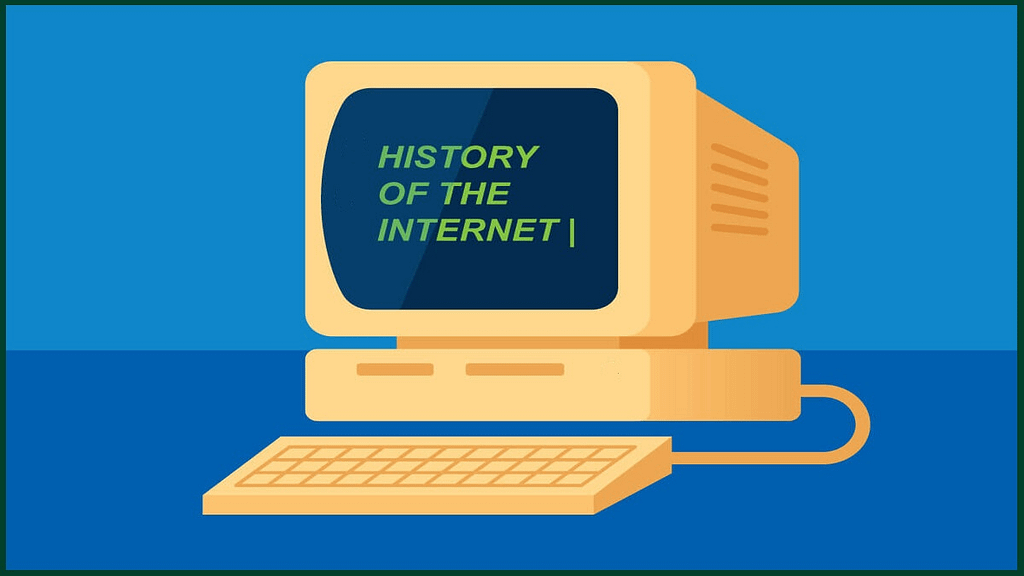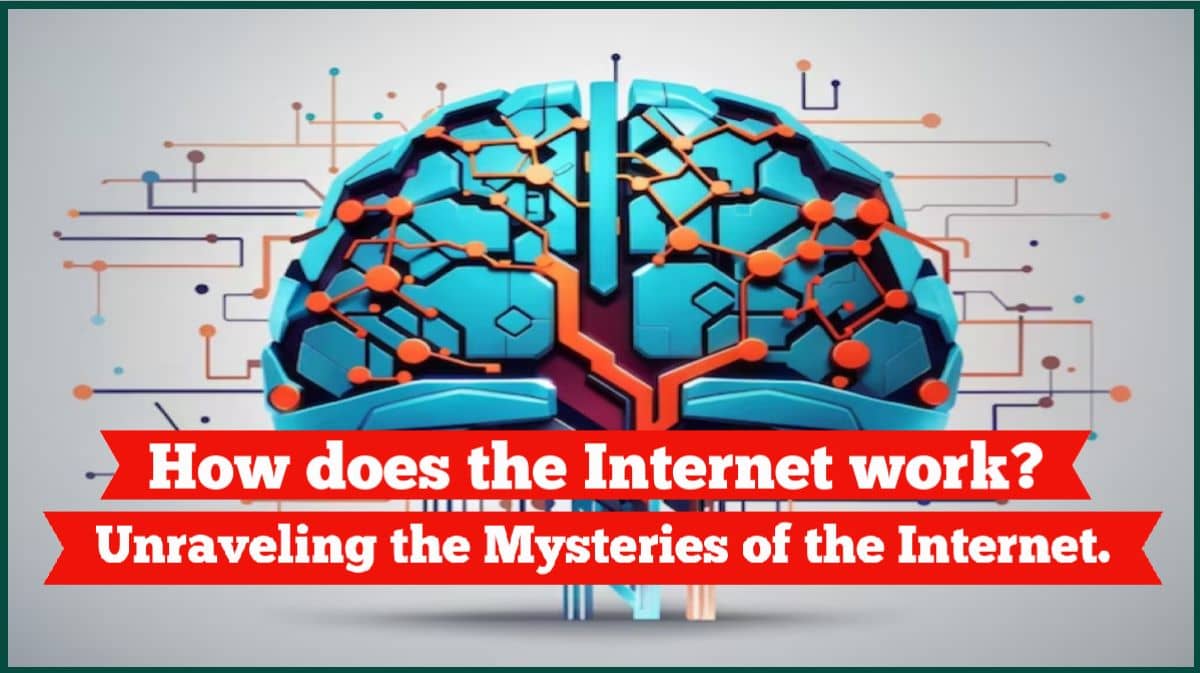Today our topic of discussion. How does the internet work? The internet has become an indispensable part of our lives, revolutionizing the way we communicate, access information, and conduct business. It is a vast network of interconnected computers that spans the globe, enabling us to connect with people and resources from all corners of the world. But have you ever wondered how this remarkable system actually works? In this comprehensive guide, we will delve into the inner workings of the internet, demystifying its complex infrastructure and shedding light on the processes that allow it to function seamlessly.
What is the Internet?
Before delving into the intricate details of how the internet operates, let’s start by answering the fundamental question: What is the Internet? The internet, short for “interconnected networks,” is a global system of interconnected computer networks that use the Internet Protocol (IP) to link devices worldwide. It serves as a massive digital highway that allows the exchange of information, data, and multimedia content across the globe.
History of the Internet

To truly understand the internet, it is important to explore its origins. The internet as we know it today has its roots in the early 1960s, when researchers began developing a way to connect computers to share information. This led to the creation of ARPANET, a network funded by the U.S. Department of Defense. Over the years, ARPANET evolved and expanded, eventually becoming the foundation for the modern internet. It was in the 1990s that the internet gained widespread popularity with the advent of the World Wide Web, a system of interconnected hypertext documents accessible via the internet. Since then, the internet has continued to evolve, with new technologies and advancements constantly shaping its landscape.
Understanding the Infrastructure of the Internet
The internet may seem like a vast, intangible entity, but it is actually a physical infrastructure consisting of a network of cables, routers, switches, and servers. These components work together to transmit data across the globe. At the heart of this infrastructure are Internet Service Providers (ISPs), companies that provide individuals and organizations with internet access. ISPs connect their customers to the internet through a variety of means, including fiber optic cables, satellite links, and wireless connections. This infrastructure is constantly expanding and improving to meet the growing demands of users worldwide.
How Data Travels Through the Internet

When you send an email, stream a video, or browse a website, your data is broken down into packets, small units of information that are transmitted across the internet. These packets travel through a series of routers, devices that direct data along the most efficient path to its destination. Each router examines the destination address of the packet and forwards it to the next router until it reaches its final destination. This process happens in a matter of milliseconds, allowing for near-instantaneous communication across vast distances. It is through this intricate system of routing and data transmission that the internet is able to connect billions of devices worldwide.
Internet Protocols and Standards

To ensure that data can be transmitted and understood across different devices and networks, the internet relies on a set of protocols and standards. The most widely used protocol is the Internet Protocol (IP), which assigns a unique address to each device connected to the internet. This address allows data to be sent and received between devices. Another important protocol is the Transmission Control Protocol (TCP), which ensures that data is transmitted reliably and in the correct order. These protocols, along with many others, form the foundation of the internet and enable seamless communication between devices and networks.
Exploring the Different Layers of the Internet

The internet can be thought of as a series of interconnected layers, each with its own specific function. At the lowest level is the physical layer, which consists of the physical infrastructure that carries data across the internet. Above that is the network layer, which handles the routing of data packets. The transport layer is responsible for ensuring the reliable delivery of data, while the application layer encompasses the various services and applications that utilize the internet, such as web browsing, email, and file sharing. Understanding these layers is crucial for grasping the complexities of the internet and how different technologies interact with each other.
The Role of ISPs (Internet Service Providers)

Internet Service Providers (ISPs) play a crucial role in connecting users to the internet. They provide individuals and organizations with internet access, either through wired or wireless connections. ISPs can range from large national companies to small local providers, each with their own infrastructure and coverage areas. ISPs are responsible for managing the networks that transmit data and ensuring that users have a reliable and fast internet connection. They also often offer additional services, such as email accounts, web hosting, and security features. Choosing the right ISP is important for ensuring a smooth and reliable internet experience.
How to earn money using Chat GBT can be found in this article.
Introduction to the ACP Program (Advanced Connectivity Program)
The Advanced Connectivity Program (ACP) is an initiative aimed at expanding internet access to underserved areas and bridging the digital divide. It is a collaborative effort between governments, private companies, and non-profit organizations to bring affordable and reliable internet connectivity to communities that have limited or no access to the internet. The ACP program utilizes innovative technologies and business models to overcome the challenges of connecting remote and rural areas. By providing internet access to these communities, the ACP program aims to unlock their potential for economic growth, education, and social development.
Benefits and Applications of the ACP Program
The ACP program has the potential to transform the lives of individuals and communities in underserved areas. By connecting them to the internet, the program opens up a world of opportunities. Education is one area where the ACP program can have a significant impact. Access to online educational resources and distance learning programs can provide students in remote areas with the same educational opportunities as their urban counterparts. The ACP program also has the potential to spur economic growth by enabling entrepreneurs and small businesses to access global markets and connect with customers and suppliers. Additionally, the program can improve healthcare delivery by facilitating telemedicine services and remote patient monitoring. The possibilities are endless, and the ACP program is paving the way for a more inclusive and connected world.
Future Technologies Shaping the Internet

The internet is constantly evolving, with new technologies and advancements shaping its future. One such technology is the Internet of Things (IoT), which involves connecting everyday objects to the internet, allowing them to communicate and interact with each other. This has the potential to revolutionize industries such as healthcare, transportation, and agriculture. Another emerging technology is 5G, the next generation of wireless communication. 5G promises faster speeds, lower latency, and greater capacity, enabling new applications and services that were previously not possible. Artificial intelligence (AI) and machine learning are also playing a significant role in shaping the internet, with applications ranging from personalized recommendations to autonomous vehicles. As these technologies continue to advance, the internet will become even more integrated into our daily lives.
Internet Security and Privacy Concerns

With the increasing reliance on the internet comes the need for robust security measures. The interconnected nature of the internet makes it vulnerable to cyber threats, such as hacking, malware, and identity theft. It is crucial for individuals and organizations to take steps to protect their data and privacy. This includes using strong passwords, keeping software and devices up to date, and being cautious when sharing personal information online. Additionally, governments and regulatory bodies play a role in ensuring that internet users are protected from cyber threats. Laws and regulations are in place to safeguard privacy and punish those who engage in illegal activities online. As the internet continues to evolve, the importance of security and privacy will only become more pronounced.
Termination
The internet is a complex and ever-evolving system that has transformed the way we live, work, and communicate. Understanding how it works is essential for navigating the digital landscape and harnessing its full potential. From its humble beginnings to the advanced connectivity programs of today, the internet has come a long way. As we look to the future, the internet will continue to shape our lives, connecting us in ways we never thought possible. It is up to us to embrace its power responsibly and ensure that it remains a force for good in our increasingly interconnected world.
Reference
BBC NEWS
Some more Internet related questions and answers.
How did the internet evolve over the years?
The internet has evolved from its modest beginnings as ARPANET into a global phenomenon. Its growth has been fueled by advancements in technology, increased connectivity, and the development of user-friendly interfaces.
Is the internet the same as the World Wide Web (WWW)?
No, the internet and the World Wide Web are not the same. The internet is the vast network of interconnected computers, while the World Wide Web is a subset of the internet consisting of web pages and websites accessible through web browsers.
Who controls the internet?
The internet is a decentralized network with no single entity in control. Various organizations, including ICANN (Internet Corporation for Assigned Names and Numbers), oversee specific aspects like domain names and IP address allocation.
What is the future of the internet?
The future of the internet holds exciting possibilities, including faster connections through 5G and beyond, the widespread adoption of the Internet of Things (IoT), and increased emphasis on cybersecurity to protect user data.
How can I stay safe on the internet?
To stay safe on the internet, practice good cybersecurity habits, use strong passwords, keep software up to date, be cautious of phishing scams, and consider using a Virtual Private Network (VPN) for added security.
How has the internet transformed communication?
The internet has revolutionized communication by enabling real-time messaging, video conferencing, and social media platforms. It has made the world more interconnected, allowing people to communicate and collaborate globally.

